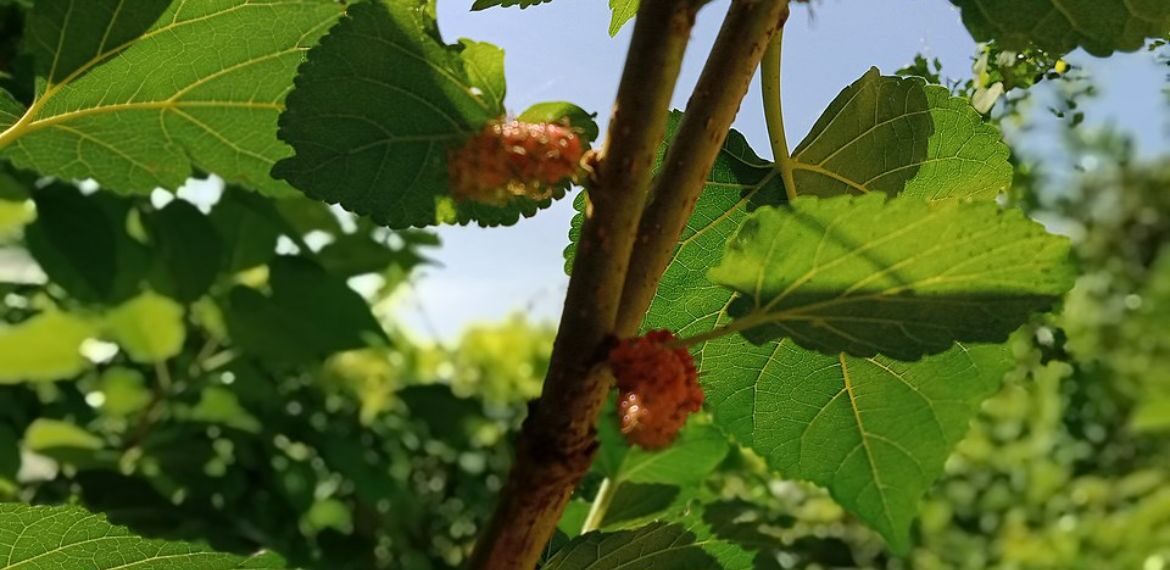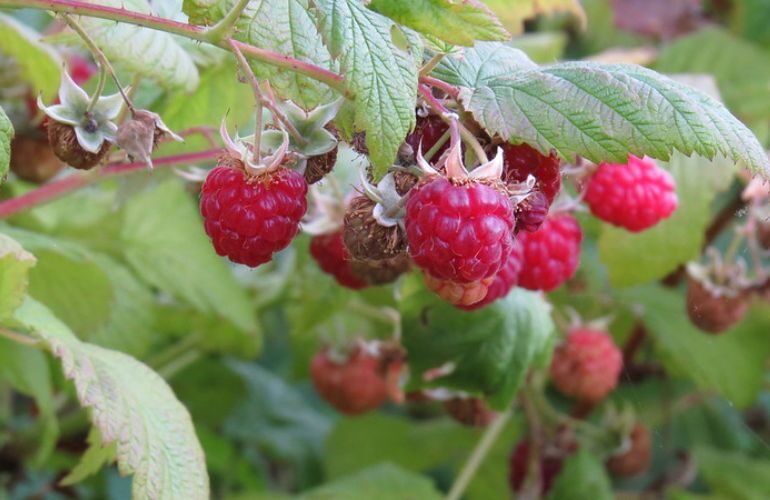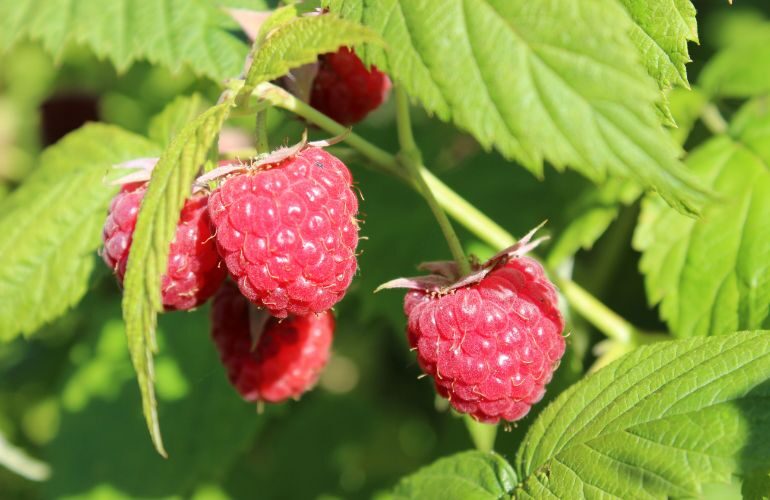Identification
A raspberry plant can be identified with following characteristics:
- Leaves: Raspberry plants have compound leaves with 3-5 leaflets that are toothed and pointed. The leaves are usually green on top and slightly lighter on the bottom.
- Canes: Raspberry plants have woody canes that are usually green or brown and covered in thorns. These canes can grow up to 6 feet tall and may need to be trellised or supported.
- Fruit: Raspberry plants produce small, red or black berries that are round and have a hollow center.
- Flowers: Raspberry plants have white to pale pink flowers that bloom in late spring or early summer.
To confirm that you have a raspberry plant, you can also crush a leaf or break a stem and check for a strong, sweet smell that is characteristic of raspberries.
Various parts of the raspberry plant have been used for medicinal purposes for centuries. Here are some of the commonly used parts:
- Leaves: Raspberry leaf tea is a popular herbal remedy that is made from the leaves of the raspberry plant. It is believed to have astringent properties that help to tone the uterus and may be used to support reproductive health.
- Berries: Raspberry fruit is high in antioxidants and may have anti-inflammatory properties. Some research suggests that consuming raspberry fruit may help to reduce the risk of chronic diseases such as heart disease and cancer.
- Roots: Raspberry root has been traditionally used in herbal medicine as a digestive aid and to help reduce inflammation in the body.
Common Name
Raspberry
Scientific Name
Rubus idaeus
Name in popular languages
- Spanish: Frambuesa
- French: Framboise
- German: Himbeere
- Italian: Lampone
- Portuguese: Framboesa
- Russian: Малина (Malina)
- Chinese: 覆盆子 (Fù pén zǐ)
- Japanese: ラズベリー (Razuberii)
- Arabic: توت العليق (Tout al ‘aleiq)
- Hindi: रसभरी (Rasbhari)
- Bengali: রাসবেরি (Rasberi)
- Gujarati: રાસપ્બેરી (Raspberi)
- Kannada: ರಾಸ್ ಬೆರಿ (Raas beri)
- Malayalam: റാസ്പ്ബെറി (Raspberi)
- Marathi: रसभरी (Rasbhari)
- Punjabi: ਰਾਸਪਬੈਰੀ (Raaspberi)
- Tamil: ராஸ்பெரி (Raasperi)
- Telugu: రాస్ప్బెర్రీ (Raspberi)
Origin and History
The Raspberry plant, Rubus idaeus, is native to Europe and Northern Asia. The plant has been cultivated for its fruit for centuries and has a long history of use for medicinal purposes as well.
In ancient times, Raspberry leaves were used in traditional medicine as a remedy for gastrointestinal disorders, respiratory ailments, and as a uterine tonic. The leaves were also used topically as an astringent to treat wounds and skin conditions. Raspberry fruit was believed to have cooling properties and was used to relieve fever and quench thirst.
During the Middle Ages, Raspberry fruit was considered a luxury item and was primarily consumed by the wealthy. It was also used to make wine, vinegar, and jams. In the 16th century, herbalist John Gerard recommended Raspberry leaves as a remedy for “over-swelling of the spleen” and “pain in the stomach and bowels.”
Today, Raspberry fruit and leaves are still used in herbal medicine to support reproductive health, relieve gastrointestinal discomfort, and reduce inflammation. Raspberry leaf tea is a popular herbal remedy for women’s health, particularly during pregnancy and childbirth. Raspberry fruit is also a rich source of antioxidants and may have anti-inflammatory properties that support overall health and well-being.
Nutritional constituents
Raspberry plants (Rubus spp.) are a good source of several essential nutrients, including:
- Fiber: Raspberries are high in fiber, with one cup of raspberries providing 8 grams of fiber. Fiber is important for digestive health and can help lower cholesterol levels.
- Vitamin C: Raspberries are a good source of vitamin C, with one cup providing about 50% of the daily recommended intake. Vitamin C is an antioxidant that supports immune function and helps the body absorb iron.
- Manganese: Raspberry plants are a good source of manganese, a mineral that supports bone health, wound healing, and metabolism.
- Vitamin K: Raspberry plants contain vitamin K, which is essential for blood clotting and bone health.
- Antioxidants: Raspberries are rich in antioxidants, including anthocyanins, ellagic acid, and quercetin. These compounds have been shown to have anti-inflammatory and anti-cancer properties.
- Other nutrients: Raspberry plants also contain small amounts of other vitamins and minerals, including vitamin E, magnesium, and potassium.
Overall, raspberry plants are a nutritious food that can be enjoyed as a fresh fruit or incorporated into a variety of dishes.
Medicinal or Health Benefits
Raspberry plants have a long history of traditional use for medicinal purposes. Here are a few examples of traditional health benefits associated with raspberry plants:
- Digestive health: Raspberry leaves have been used traditionally as a digestive aid. They are believed to have astringent properties, which can help reduce inflammation and soothe digestive discomfort.
- Women’s health: Raspberry leaves have traditionally been used to support women’s health, particularly during pregnancy. They are believed to help strengthen the uterus and promote a healthy pregnancy.
- Respiratory health: Raspberry leaves have been used traditionally as a natural remedy for respiratory conditions, such as asthma and bronchitis. They are believed to have expectorant properties, which can help loosen phlegm and ease coughs.
- Skin health: Raspberry plants contain high levels of antioxidants, which can help protect the skin against cellular damage and oxidative stress. Raspberry leaf extract has been used traditionally as a natural remedy for skin conditions, such as eczema and psoriasis.
- Blood sugar control: Some traditional uses of raspberry plants include managing blood sugar levels. Raspberry leaf tea has been used traditionally to help regulate blood sugar in individuals with diabetes.
It’s important to note that traditional uses of raspberry plants have not been extensively studied using modern scientific methods. More research is needed to fully understand the potential health benefits of raspberry plants and to determine safe and effective dosages for different conditions. It’s always a good idea to talk to your healthcare provider before using natural remedies for health purposes.
Scientific Perspective
Raspberry plants have been studied for their potential health benefits, and some scientific research suggests that they may have medicinal properties. Here are a few examples of research on the health benefits of raspberry plants:
- Anti-inflammatory effects: Raspberry plants contain several compounds, including ellagic acid and anthocyanins, which have been shown to have anti-inflammatory effects. A study published in the journal Nutrients found that consuming a raspberry supplement reduced markers of inflammation in overweight individuals.
- Antioxidant properties: Raspberry plants are high in antioxidants, which can help protect against cellular damage and oxidative stress. A study published in the Journal of Agricultural and Food Chemistry found that raspberry extracts had high antioxidant activity and could potentially protect against chronic diseases.
- Anti-cancer effects: Some research has suggested that raspberry plants may have anti-cancer properties. A study published in the Journal of Medicinal Food found that raspberry extract inhibited the growth of colon cancer cells in vitro.
- Cardiovascular health: Raspberry plants have been shown to have potential benefits for cardiovascular health. A study published in the journal Nutrition, Metabolism & Cardiovascular Diseases found that consuming raspberry juice improved endothelial function in patients with metabolic syndrome.
- Digestive health: Raspberry plants contain fiber, which is important for digestive health. A study published in the Journal of Agricultural and Food Chemistry found that raspberry extracts increased the growth of beneficial gut bacteria in vitro.
Overall, more research is needed to fully understand the potential health benefits of raspberry plants and to determine optimal dosages and formulations for different conditions. It’s important to talk to your healthcare provider before using raspberry supplements or any other natural remedies for health purposes.
FDA's perspective
In the United States, the Food and Drug Administration (FDA) regulates the use of natural remedies and dietary supplements, including raspberry products. The FDA does not evaluate the safety or effectiveness of these products before they are marketed, but they can take action against companies that make false or misleading claims about their products.
According to the FDA, any health claims made about raspberry products must be supported by scientific evidence. Companies that market raspberry products are required to include a disclaimer on their labels stating that the product is not intended to diagnose, treat, cure, or prevent any disease.
The FDA has not approved any specific health claims for raspberry products, but raspberry extracts and other raspberry-based supplements are widely available as dietary supplements. Consumers should be cautious when using these products and should always read the label carefully before use.
References
- Red Raspberries and Their Bioactive Polyphenols: Cardiometabolic and Neuronal Health Links – PMC (nih.gov)
- Raspberries: Health benefits, nutrition, tips, and risks (medicalnewstoday.com)
- Red Raspberry – National Nutrition Articles
- The U.S. Food and Drug Administration (FDA)
- Generally Recognized as Safe (GRAS) | FDA




